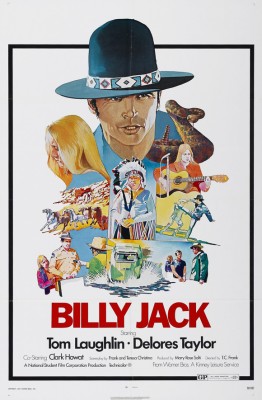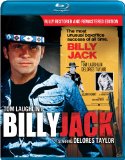| Reviews & Columns |
|
Reviews DVD TV on DVD Blu-ray 4K UHD International DVDs In Theaters Reviews by Studio Video Games Features Collector Series DVDs Easter Egg Database Interviews DVD Talk Radio Feature Articles Columns Anime Talk DVD Savant Horror DVDs The M.O.D. Squad Art House HD Talk Silent DVD
|
DVD Talk Forum |
|
|
| Resources |
|
DVD Price Search Customer Service #'s RCE Info Links |
|
Columns
|
|
|
Billy Jack
It's an odd picture, a true relic of its time. Though often naïve and/or contradictory when not outright ludicrous, it also has an undeniable earnestness and raw power. This latter facet, combined with director-star-co-writer Tom Laughlin's extremely shrewd marketing, made Billy Jack one of the most successful (essentially) independent films of all-time.
The "fully restored and remastered edition" of Billy Jack looks and sounds terrific. Laughlin seems to have taken good care of the original film elements, which in high-def look absolutely pristine. The transfer is outstanding and the 5.1 DTS-HD Master Audio greatly enhances what originally was a monophonic film. The extras are a mixed, very eccentric bag, but worthwhile overall.
The character of Billy Jack (Laughlin) was first introduced in the biker movie The Born Losers (1967) but is redefined here as a mysterious, Shane-like Western hero, the self-appointed protector of the Freedom School, a commune-like drug-free retreat run by soft-spoken hippie schoolmarm Jean Roberts (Delores Taylor, Laughlin's real-life wife and the film's co-writer)* and which encourages racial harmony, pacifism, and unfettered creativity. Like Shane Billy Jack is not part of this community but an outsider: the dissatisfied "half-breed" Cherokee-hapkido master-former Green Beret and Vietnam vet is too prone to violent outbursts, boiling with barely contained rage at the unjust treatment of the schoolchildren and teenagers by racist whites in the nearby Arizona town.
Tensions between the town and the school heat up when Barbara (Julie Webb), the daughter of sheriff's Deputy Mike (Ken Tobey) returns home from Haight-Ashbury knocked up yet has no idea who (or what race) the father is. After outraged Mike beats his teenage daughter, Jean invites her to stay at Freedom School. Meanwhile wealthy, violent Stuart Posner (Bert Freed) - who enjoys illegally slaughtering wild Mustangs for easy money, six cents/pound - goads his pampered, racist son Bernard (David Roya) into committing hate crimes against Freedom School, acts that finally send Billy Jack over the edge.
Billy Jack began shooting in 1969 as an AIP (American International Pictures) release, AIP being the same company that distributed The Born Losers. However, AIP pulled out and shooting resumed a few years later with 20th Century-Fox acting as Laughlin's distributor, but when they declared the film unreleasable (or something; the story gets awfully murky at this point) Laughlin took Billy Jack to Warner Bros. It's not clear whether the film was a hit or a flop in 1971, but a dissatisfied Laughlin eventually sued Warners and won or bought back controlling rights to the picture. He reissued it pretty much by himself in 1973 on a four-wall basis (i.e., he rented outright theaters exhibiting the film) and it became a huge hit, the roughly $800,000 production reportedly grossing about $40 million during this re-release alone.
The film itself is a strange mixture of the powerful and immediate with the hopelessly dated and the ridiculous. The justly famous opening sequence, with the titles superimposed over aerial shots of wild mustangs being driven into a gorge to be slaughtered, is at once beautiful and disturbing.** (Coven's popular "One Tin Soldier" on the soundtrack adds to its effectiveness.) Bernard's humiliation of some Native American and mixed-race children at an ice cream parlor is crudely filmed but also has an air of authentic racial disharmony rare for the period. This is immediately followed by a scene both unintentionally funny and a real crowd-pleaser: Billy Jack shows up to confront Bernard and his pals, unsuccessfully trying to control his anger before unleashing his deadly hapkido kicks. Laughlin in this scene works up such intensity you think he's going to have a stroke. (Billy Jack's famous line, "I think of the number of years that she's going to have to carry in her memory... the savagery of this idiotic moment of yours... I just go BERSERK!" is to Laughlin what "Somebody ought to belt you in the mouth. But I won't. I won't. The HELL I won't!" is to John Wayne.)
Many critics point to scenes like these as examples of the film hypocrisy, of ludicrously promoting non-violence in a film that at the same time seems to justify it. (Also in the picture are a fairly graphic rape scene and several murders). That's true to a point, but significantly Billy Jack is an outsider, and like, say, Ethan Edwards in The Searchers, the filmmakers don't necessarily approve of his knee-jerk violence, though the Laughlins certainly seem cognizant of the crowd-pleasing reaction such scenes elicited, and were savvy enough to refashion Billy Jack in The Trial of Billy Jack and Billy Jack Goes to Washington as a Capraesque American hero fighting a corrupt system.
At least all of Laughlin's scenes are entertaining, and his martial arts kicks, more authentic than just about anything being done in America at the time and predating the Bruce Lee phenomenon, really wowed 1971 (and 1973) audiences. However, large chunks of the film shift away from Billy Jack to chronicle life at Freedom School, where the narrative tends to stop dead to basically promote this alternate way of living. These scenes are sometimes boring, sometimes fascinating, and sometimes boring and fascinating at once. Hollywood movies usually never came close to realistically portraying hippie life, the real ambitions and concerns of the teenagers and adults dropping out of conventional society in the 1960s and early-'70s, but Billy Jack, in spite of some bad acting here and there, comes closer than most to really capturing the essence of this facet of society. This is compromised a little because the Laughlins hedged their bets by bringing in a professional improv group called The Committee (including Howard Hesseman, who does a Cheech & Chong-type skit with another actor) to play students in the school's drama class. They're just a little too polished to be believed, but other scenes, including a chaotic city council meeting, have an immediate, documentary-like air.
This attempt to sacrifice professional polish in the name of authenticity is best exemplified by Delores Taylor's performance. She was only in her early-thirties but without makeup looks much older and she's clearly not an actress and quite inadequate in some scenes. And yet, the sincerity of her performance sort of compensates for her lack of experience. Soft-spoken and mousy, she's like a hippie Zasu Pitts, which is more a compliment than a complaint.
Video & Audio
Shot for 1.85:1 projection, Billy Jack is impressively sharp and free of age-related wear. Except for what appears to be original negative scratches on the film lasting less than a second, the 1080p transfer is basically flawless. The blues of the Arizona skies ring true, and the film has a pleasing fine grain without any distracting DNR. The detail gives the film an almost three-dimensional quality at times; there are close-ups of Ken Tobey where you can see every line, every pore on his pockmarked face and just about count every bright-red hair on his head.
For the DTS-HD Master Audio, the film's soundtrack, originally mono, has to great advantage been remixed with a full stereo underscoring and directional sound effects, though the dialogue is largely centered. The disc is region "A" encoded.
Extra Features
The supplements, all apparently carryovers from the 2000 and 2005 DVD releases, include, curiously, two largely identical audio commentaries featuring Tom Laughlin and Delores Taylor. I didn't listen to both all the way through, but bouncing back and forth between them I couldn't help but wonder why they bothered to do essentially the same track twice. There are some differences, but how many Billy Jack fans will want to endure nearly four hours of commentary?
Also included is a very strange featurette about the making of Billy Jack, which eschews on-camera interviews with animated graphics while Laughlin, in badly-recorded narration, discusses the production as a kind of shaggy dog story. Poor elements of TV spots from the 1973 re-release, badly transferred, are also included.
Parting Thoughts
Though more a relic of its era than a good movie, Billy Jack should be seen at least once, and Image's new Blu-ray disc is definitely the optimal way to see it. The transfer is outstanding and this reviewer hopes Billy Jack's famously bad sequels aren't far behind.
* The Laughlins wrote the film together as "Frank and Theresa Christina" and Laughlin directed under the pseudonym "T.C. Frank."
** If memory serves, Stanley Kramer's Bless the Beasts and Children, coincidentally released almost simultaneously, has a very similar opening.
Stuart Galbraith IV's latest audio commentary, part of AnimEigo's forthcoming Tora-san DVD boxed set, is available for pre-order, while his latest book, Japanese Cinema, is in bookstores now.
|
| Popular Reviews |
| Sponsored Links |
|
|
| Sponsored Links |
|
|
| Release List | Reviews | Shop | Newsletter | Forum | DVD Giveaways | Blu-Ray | Advertise |
|
Copyright 2024 DVDTalk.com All Rights Reserved. Legal Info, Privacy Policy, Terms of Use,
Manage Preferences,
Your Privacy Choices | |||||||














